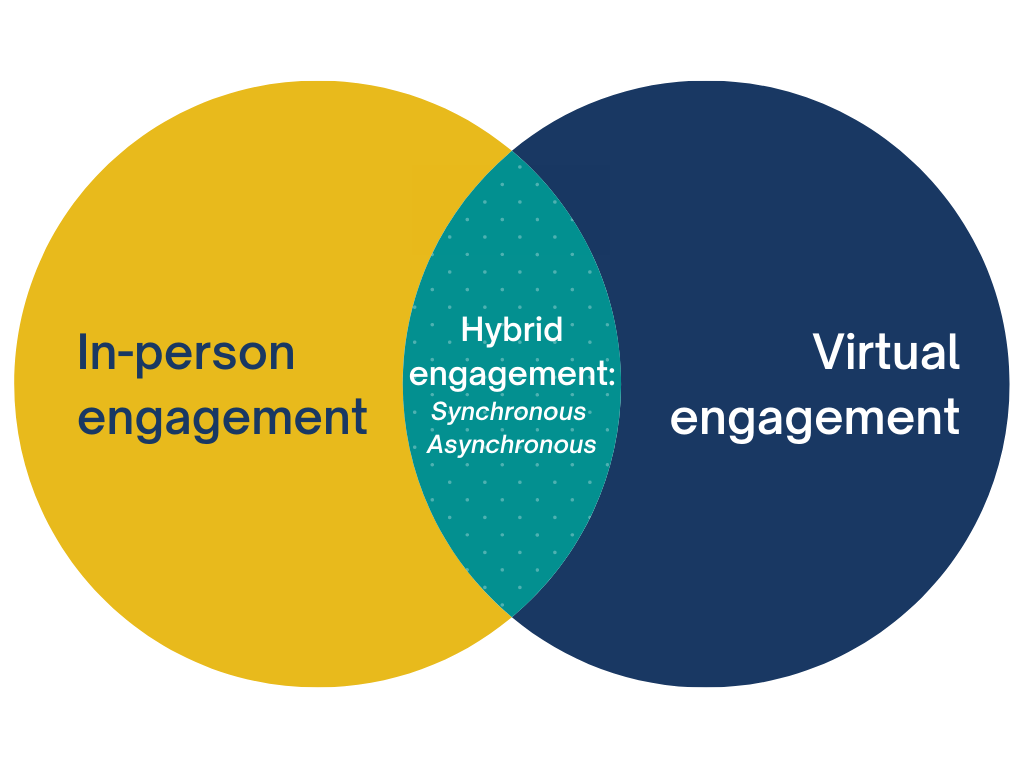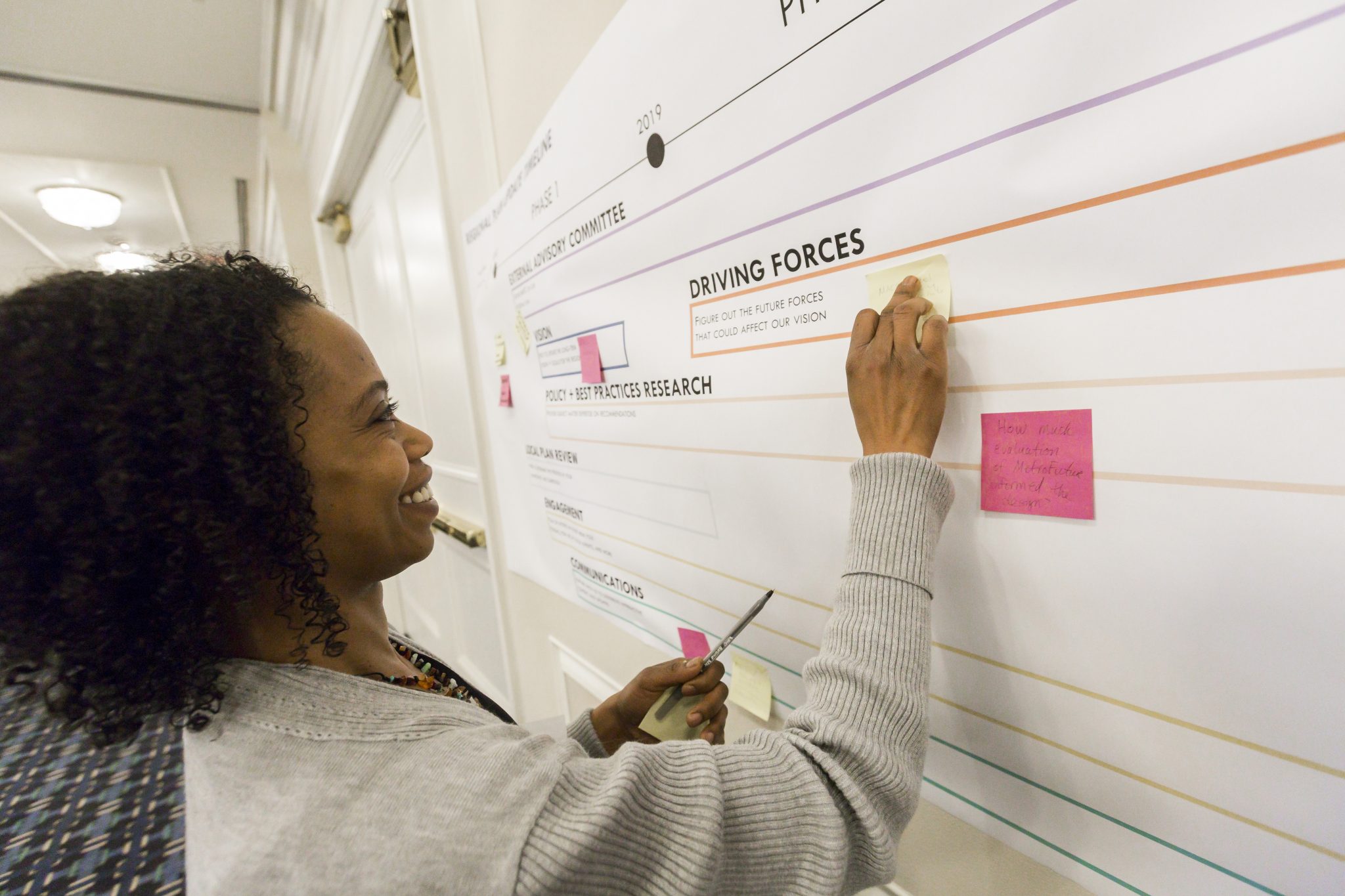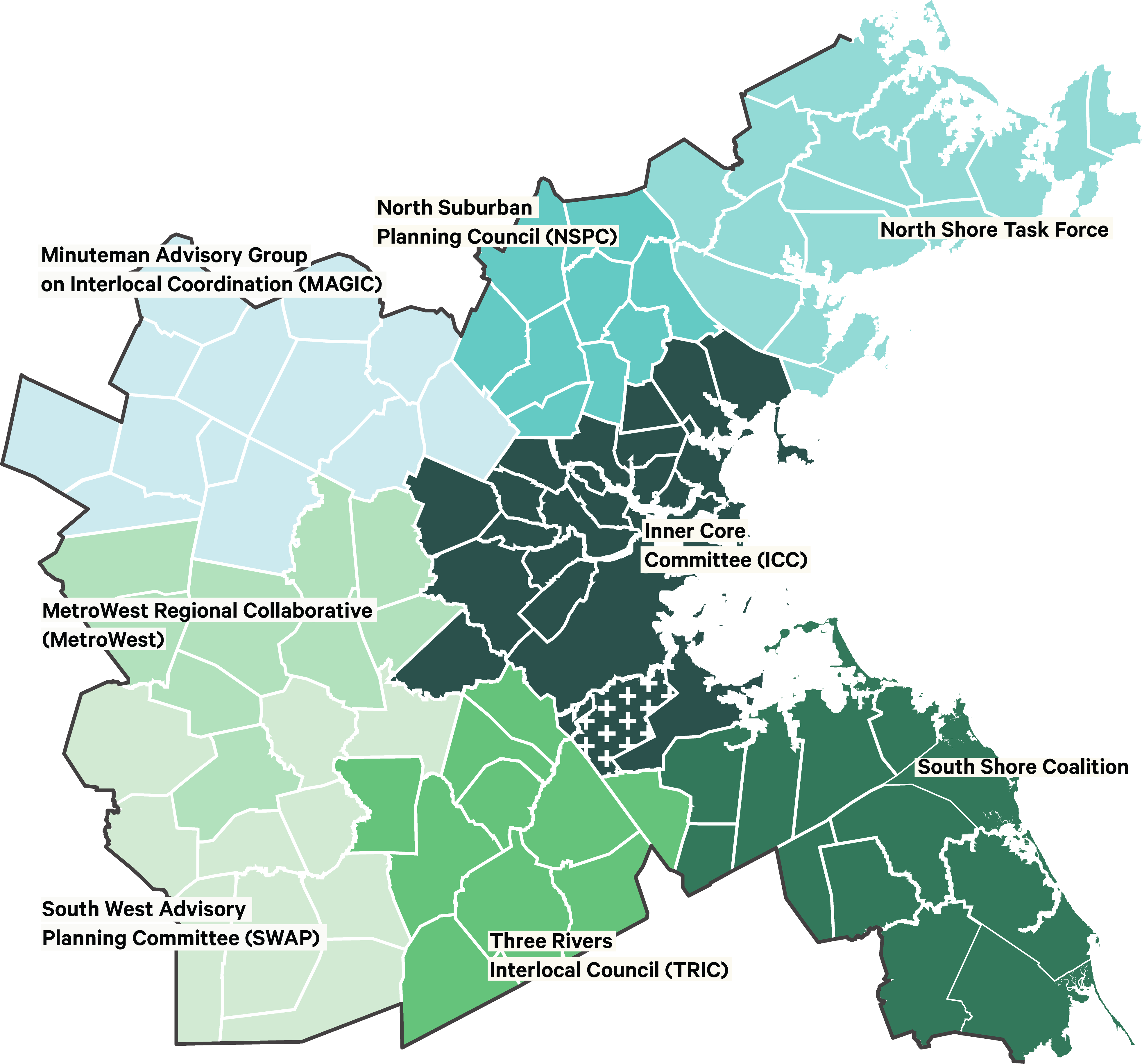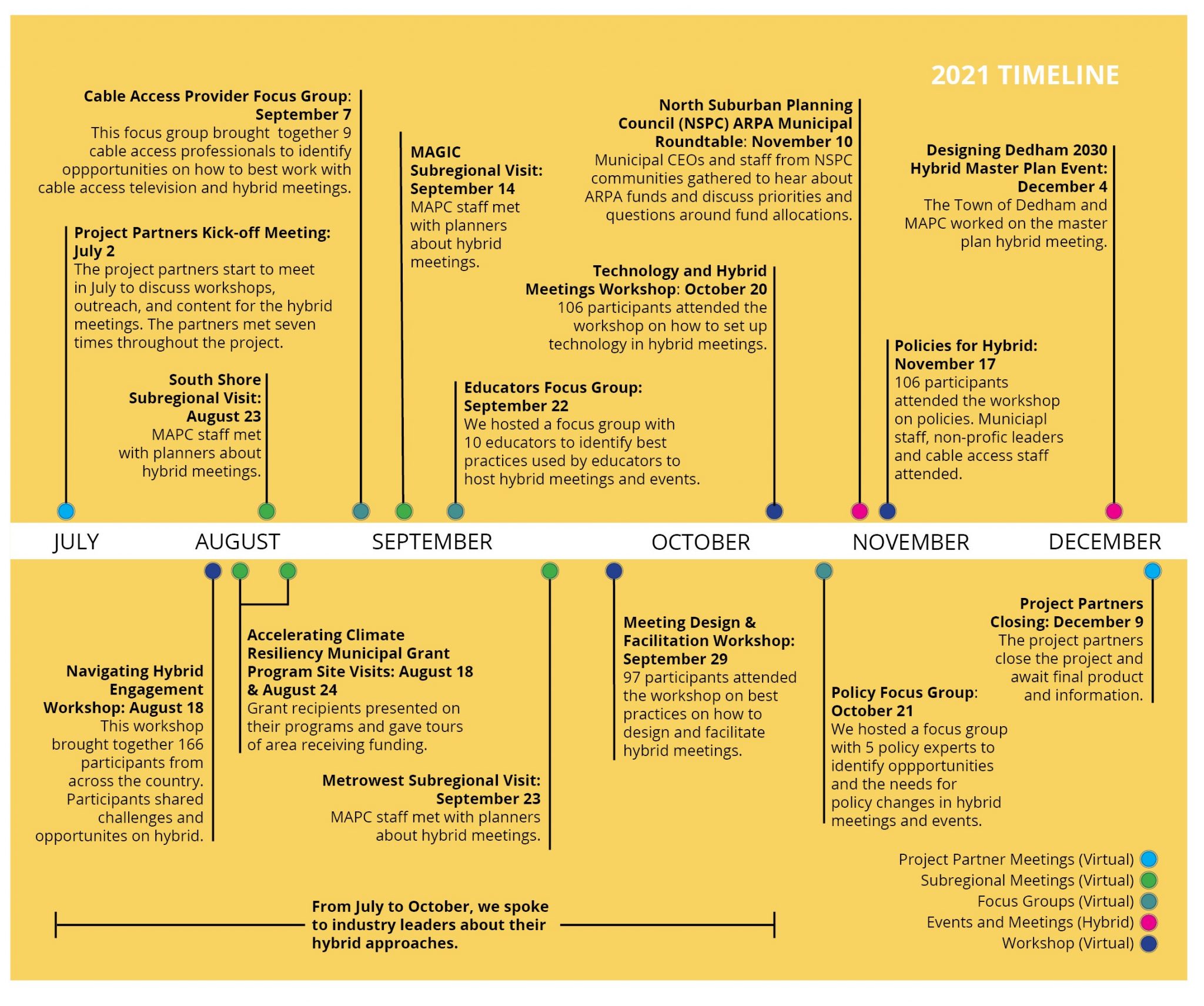Hybrid Engagement Hub: Navigating Together
Shared practices, tools, and policies
Remote Meetings - Make Your Voice Heard!
The current re-authorization to allow public bodies to host remote meetings is set to expire on March 31, 2023 put in place by Governor Baker. We urge you to contact your legislators today to ask them to extend the current remote meeting regulations! You can do so by using our email template (button to the right). Learn more about this legislative priority.
This project hub is designed to be a central source of information to support you as you develop your approach to hybrid meetings, investigate tools, and design public participation at the local level.
In the summer of 2021, the Metropolitan Area Planning Council (MAPC) launched an initiative focused on identifying the needs of municipalities and their staff around hybrid engagement during the second year of the COVID-19 pandemic. Through this process, three municipal teams from Randolph, Framingham, and Dedham, alongside the community engagement staff at MAPC, convened hundreds of people across our region and the nation to develop shared practices and tools for hosting meetings that bridge remote and in-person participation. We explored meeting facilitation and design, technology needs, and current state law and policy debates that impact municipal meeting policies. The recommendations included here are the culmination of that work.
Although the team has been meeting since July 2021, there is still a lot of work to be done. The Community Engagement Division is committed to supporting our municipal partners with the journey of virtual, in-person, and hybrid engagement. With the continuous and ever-changing needs of our communities, we know we must have virtual, in-person and hybrid engagement tools and experience to support our constituents. We see hybrid, synchronous, and asynchronous engagement as the future of our work together.
Our goal is to make sure there is a multi-layered approach to our work and to push forward diverse ways to engage our community members. Ultimately, we want to see equitable outcomes for residents in the region.
If you want to partner with us on your next project, contact [email protected].
Timeline
From July to December 2021, the hybrid engagement project team hosted multiple meetings, focus groups, and workshops.
Quick Definitions
Asynchronous Hybrid Engagement:
Virtual and in-person engagement activities occur at separate times, so participants do not have to gather for a live session. Instead, in-person and virtual meetings could happen at separate times, or participants can access previously recorded content on their own schedule.
Synchronous Hybrid Engagement:
Attendees participate live at a specified date and time, either remotely or in-person. The facilitator(s) may also be in-person and/or virtual and there is two-way communication between the presenters and audiences.

On this webpage, most of our framing focuses on events that include in-person and remote components simultaneously (synchronous engagement), with the in-person venue as the primary operating space. Some recommendations may be applicable to other types of hybrid engagement as well.
What to Keep in Mind When Planning for Hybrid Engagement
There is a lot of information in this hub, and we know you may have many questions. Hybrid engagement continues to be an emerging area of practice and with that we encourage you to keep an adaptable mindset to this work. We also recognize that implementing hybrid meetings and events requires extensive staff, technology, and monetary resources. If you are not currently equipped with the budget and resources, hybrid may not be the best fit for you at the moment and that’s okay.
You can always reach out to the MAPC Community Engagement team at [email protected].
From your feedback, we have developed tools and tips to support you in the development of hybrid engagement in your own work. As you read through them all, we invite you to keep the following in mind:
Choosing Your Meeting Type
Hybrid engagement is a powerful emerging practice with many applications. However, it does not have to be the default. Before you go down the road of coordinating a hybrid event, consider whether this is the best route for you, your team and, most importantly, the audience you will be engaging with. There are many reasons you may not want to do hybrid engagement: perhaps your audience has limited technological access (in which case in person may work better), perhaps there has been a spike in cases and folks would feel safer gathering completely remotely, perhaps the event includes too many moving pieces and would be easier to coordinate via one platform.
As you determine whether to go with hybrid, consider the following tools. Only you can decide whether hybrid is the right engagement approach for your meeting or event, but we hope these frames of reference help you make the decision.

Facilitation and Planning
When thinking about meeting design and facilitation there can be so much to consider. It’s not just about content, but how you deliver that content and setting up an environment that is conducive to participant engagement.
As you make decisions for your event, we invite you to use this Facilitation Guide Template. View this guide as an adjustable template. Feel free to download it and fill in the blanks on your specific event or use it as a reference for your own agenda.
For more information on Hybrid Meeting Design you can also view a recording of our Hybrid Meeting Design workshop here.
Technology and Tools
Hybrid Meeting Technology FAQs
We heard many questions about how to use technology to create great event and meeting experiences. Below, we answer common questions regarding technology usage, resources, and security.

Preparation and Set UP
Always have a prep meeting before the event to run through as much as the technology as possible. Make sure all of your microphones, speakers, projectors, screens, etc. are in working condition and connect to each other properly. Try to have all those who will be staffing the meeting attend. You might ask your colleague to step out of the room, so they can help you test the virtual and in-person audio and video set-ups.
Prior to the event, be sure to also check that all your software is up to date (i.e., you have updated to the latest version of Zoom).
These days with the COVID public health crisis, plans can often change at the last minute. Prepare a technology back-up plan for staff who may have to join virtually. For example, consider who you need to make a co-host on Zoom (or any other virtual meeting platform you are using), how to structure break out rooms, which staff roles can be done remotely and require being in-person.
Finally, double check that the link to access your meeting is correct and clearly communicated, whether via social media, email, or event platforms like Eventbrite.
See the Hybrid Meeting Facilitation Guide for more guidance and tips on preparing for a hybrid meeting.
Staffing and Resources
Ideally, hybrid meetings should have at least one staff member dedicated to supporting the virtual portion of the event and one person dedicated to the in-person portion. Depending on the size of your meeting, you may want a third support staff acting as the liaison between in-person and virtual.
The virtual support staff member should be responsible for turning on recording, going live on social media, making sure the appropriate cables are hooked up, set up any cameras, manage online registration, and answer questions in chat. This person would ideally be physically present at the meeting, but they may sit in a separate, adjacent room to avoid audio interference.
There should also be facilitators lined up and ready to discuss the content of the meeting for sections of the agenda that might require break out rooms or discussion.
For more on the various roles required in a virtual meeting, see the Hybrid Meeting Facilitation Guide.
Technology Security and Access
The virtual technology point-person for your meeting should be vigilant for “Zoom-bombers” and remove them from the meeting as soon as they are identified. While the term has become known as “Zoom-bombing,” we do want to note that it is possible to do this on other remote platforms as well.
Hybrid Meeting and Event Engagement Technology
We have compiled a list of tools and technologies that our partners across the region have found to be useful in their hybrid events and meetings. This list is organized by level of technological preparedness, so you can find the cameras, microphones, or digital platforms that will best fit your needs based on where you are now.
- “Level 1” is for anyone looking to make an initial investment into hybrid meeting technology.
- “Level 2” is for those with some basic technology and are looking to level-up.
- “Level 3” includes options for major technology investments for a holistic hybrid meeting experience.
You can search by “Features” that you are looking for, such as video conferencing technology or live streaming tools. The “Requirements” column allows you to easily check what components or connections you will need to be able to use the technology.
MAPC has not tested many of these products and do not endorse any particular product or brand: we are providing this list to help our partners, municipal leaders, IT professionals, cable access leaders, and others to get started on their hybrid meeting research and procurement processes. Also, note that MAPC will aim to keep this list up to date, but technology changes rapidly so please be sure to do your own research to make sure you are using the most updated versions of these tools. To download as a CSV click on the three dots in the top bar and click 'Download CSV'.
Emerging Practices and Ideas from our Region
- Use gaming technology to facilitate virtual and hybrid meetings.
- Check out how museums have been dealing with hybrid.
- Create customized backpacks with all the technology and resources needed to run hybrid meetings. If you need to travel for a meeting, the kit will be light and easy to carry.
- Don’t neglect outreach! With all the additional planning that goes into a hybrid meeting, outreach can easily fall on the wayside. Consider involving students in your community to conduct in-person and online outreach to increase awareness of the meeting.
- Consistency is key. Stick to the same virtual meeting platform, send reminder emails from the same account, try not to make any changes at the last minute.
Policy and Advocacy Toolkit
Implementing hybrid or remote meetings for the public will require updates to state policies. In individual cities and towns, ensuring quality meetings for the public will require adopting consistent and clear policies across municipal departments. Doing this will help you standardize how to host hybrid meetings, delegate responsibility clearly and among staff, identify unmet needs, and prioritize looking for funding to best adapt to the new normal. In doing this work, remember to consult with the Attorney General’s Office.
Many of these policies can be funded through newly created sourced like the American Rescue Plan Act, the CARES Act, and the recently passed federal Infrastructure bill. We highly recommend that you consider using these funding sources to address any immediate needs implicated by these policy recommendations.
Municipal Policies
Successfully incorporating hybrid engagement formats into your practice will require adapting and creating policies that support hybrid engagement. The most important takeaway from these recommendations is the benefit of consistency for both staff and members of the public. Below is a list of key policies to consider implementing hybrid engagement at the municipal level.

Choose between hybrid, in-person, or virtual meetings and events. We recommend that you adopt a consistent approach with a decision protocol for when to host a hybrid, in-person, or virtual meeting. Refer to the Meeting Design Decisions Cycle, the Benefits and Challenges Chart, Technology FAQ, and Facilitation Guide to understand what considerations to make when creating this policy:
- Do you have staff capacity?
- Do you have the right technology?
- Under what circumstances should you change from one kind of meeting to another?
- What accessibility needs to your participants have?
We want to remind you that a hybrid event is not the default. If you do not have enough staffing or resources to successfully hold a hybrid event, there are asynchronous forms of engagement (I.e., a remote meeting and an in-person meeting at separate times on the same topic) that can be considered as well.
State Policies
The current re-authorization put in place by Governor Baker to allow public bodies to host remote meetings is set to expire on March 31, 2023. We urge you to contact your legislators today to ask them to extend the current remote meeting regulations.
Permanent remote meeting policy is one of MAPC's 2023 Legislative Priorities. MAPC supports a permanent extension to the remote meeting provisions, which would provide flexibility and maximize public participation.
As of right now, for this legislative session there is An Act relative to remote meeting access for public bodies and town meetings that has been filed by Representative Driscoll (HD.911) and Senator Gobi (SD.1247).

How You Can Help
Contact your legislators today and urge them to support making remote meetings a permanent option! You can use the email template we have created to do so. Access it now!
Our Workshops
In the summer of 2021, the MAPC launched this initiative with a webinar series exploring meeting facilitation and design, technology needs, and current state law and policy debates that impact municipal meeting policies. MAPC staff attended subregional meetings to discuss hybrid meetings with municipal representatives.
See resources and recordings from these events at the links below.









 Ryan Boyd is the Executive Director of Wakefield Community Television. He manages day-to-day studio operations and works directly within the community to help create and provide meaningful video content for the town of Wakefield. He graduated from Elon University with a degree in Communications and has worked in Los Angeles, Washington D.C., and Boston.
Ryan Boyd is the Executive Director of Wakefield Community Television. He manages day-to-day studio operations and works directly within the community to help create and provide meaningful video content for the town of Wakefield. He graduated from Elon University with a degree in Communications and has worked in Los Angeles, Washington D.C., and Boston.

 Brian Luther is a Municipal Services Specialist II for MAPC's Municipal Collaboration Department. Brian works with municipal officials and staff on special projects, grants, studies, and cooperative purchases to increase efficiency, strengthen and expand municipal offerings, and better position the region to effectively address upcoming challenges. His experience and expertise span many municipal functions including public procurement, finance, health, public works, public safety, information technology, solid waste, and human resources.
Brian Luther is a Municipal Services Specialist II for MAPC's Municipal Collaboration Department. Brian works with municipal officials and staff on special projects, grants, studies, and cooperative purchases to increase efficiency, strengthen and expand municipal offerings, and better position the region to effectively address upcoming challenges. His experience and expertise span many municipal functions including public procurement, finance, health, public works, public safety, information technology, solid waste, and human resources.

 Each municipality in the MAPC region belongs to one of eight
Each municipality in the MAPC region belongs to one of eight